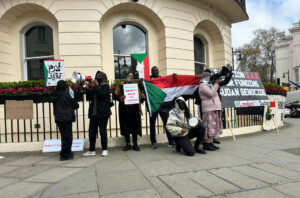UNSC: Int’l chorus lauds action on Sudan famine as millions face hunger

Edem Wosornu, Director of OCHA’s Operations and Advocacy Division, addressing the UNSC in New York, yesterday (Photo: UN.org)
Sudan’s worsening famine crisis, driven by the ongoing war and collapsing food systems, has been projected to leave over 630,000 people facing famine by May 2025, according to the latest Integrated Food Security Phase Classification (IPC) report. Discussed at the United Nations Security Council (UNSC) headquarters in New York yesterday, the crisis marks Sudan as the only country where famine has been declared in 2024.
Sudan’s worst famine in decades has already engulfed five areas, including displaced persons’ camps in North Darfur and South Kordofan, with 17 more regions at high risk.
The conflict between the Sudanese Armed Forces (SAF) and the Rapid Support Forces (RSF) has displaced millions, dismantled food systems, and left over half the population acutely food insecure.
“Children are acutely malnourished, preventable diseases are spreading, and basic services are collapsing,” said James Kariuki, UK Deputy Permanent Representative to the UN.
The United Kingdom has doubled its aid to Sudan to nearly $140 million, urging the international community to increase support for the UN and local responders. Kariuki criticised Sudanese authorities for withdrawing from the IPC system, warning that denying the crisis will only worsen suffering.
He welcomed the SAF’s commitments to establish humanitarian supply hubs and opening of the Adré crossing but called for immediate, unhindered access to all affected areas, including those under RSF control.
‘Aid in jeopardy’
At the UNSC meeting, Edem Wosornu, Director of OCHA’s Operations and Advocacy Division, stressed the need for urgent funding, expedited permits for aid workers, and the reopening of commercial supply routes.
She highlighted that Sudan’s Humanitarian Needs and Response Plan for 2025 requires $4.2 billion to support 21 million people, with an additional $1.8 billion needed for refugees in neighbouring countries.
With famine spreading and the humanitarian situation deteriorating, Wosornu described Sudan’s crisis as “man-made” and unprecedented in scale.
Food and Agriculture Organisation Deputy Director-General Beth Bechdol states that Sudan’s agricultural production has plummeted by 46 per cent, with most farmers unable to cultivate due to insecurity. She warned that millions of lives are at risk without immediate agricultural assistance.
‘US accuses Russia of duplicity’
The US accused Russia of funding both sides of Sudan’s conflict during the UNSC session, alleging Moscow’s involvement in the country’s lucrative gold trade. US Ambassador Linda Thomas-Greenfield criticised Russia’s November veto of a draft resolution calling for a ceasefire and unhindered humanitarian aid delivery.
Russia’s Deputy UN Ambassador Dmitry Polyanskiy rejected the accusations, accusing the US of exploiting global crises for its own enrichment.
Russia and China voiced strong opposition, questioning the legitimacy of the IPC report. Russia, which rejected the declaration of famine, suggested that instead of focusing on hunger, the international community should prioritise agricultural development and food distribution efforts.
The Chinese delegate emphasised the need for impartiality and professionalism in reporting on Sudan’s humanitarian situation.
Pakistan voiced concerns about foreign intervention, echoing Sudan’s objections to external involvement in the country’s internal conflict.
Last week, Lt Gen Abdelfattah El Burhan’s dismissed reports of famine in Darfur as “pure fabrication” during his televised address on Sudan’s Independence Day.











 and then
and then